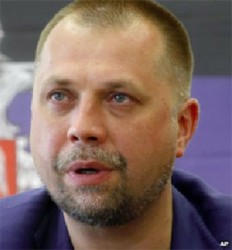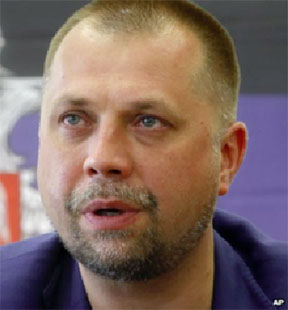DONETSK, Ukraine, (Reuters) – Fierce fighting in eastern Ukraine where a Malaysian airliner was downed further complicated an investigation yesterday as Europe and the United States prepared economic sanctions on Russia over the conflict.
At least 13 people were killed in clashes between Ukrainian troops and pro-Russian rebels that raged in five areas around the wider region.
International monitors said they had abandoned plans to visit the crash site because of fears it was not safe, even though Malaysia said earlier that rebels had agreed to provide access.
Ukraine said it was trying to dislodge the rebels, but denied it was fighting near the crash site, saying the separatists had put the monitors off by falsely claiming that the army was operating nearby.

Russia dismissed U.S. allegations it was about to hand over more missiles to the separatists, who Western leaders say almost certainly shot the airliner down by mistake with a Russian-supplied surface-to-air missile.
The separatists deny any involvement and Moscow says it has not supplied them, suggesting Ukrainian forces were to blame.
“Kiev is trying to destroy the evidence of a crime by its army,” separatist leader Aleksander Borodai said, referring to a Ukrainian army offensive some distance from the site yesterday.
With European states trying to minimise the impact of any future sanctions against Russia on their own economies, the U.S. State Department sought to bolster the case for robust action by releasing images it said showed Russian forces had fired across the border at the Ukrainian military in the last week.
The images, which show marks on the ground at what the State Department said were launch sites and impact craters around Ukrainian military locations, indicated fire from multiple rocket launchers, the department said.
It also said the images offered evidence that Russia-backed separatists inside Ukraine had fired on Ukrainian forces using heavy artillery supplied by Russia.
The Russian Foreign Ministry said Foreign Minister Sergei Lavrov and U.S. Secretary of State John Kerry had agreed on the need to ensure a swift ceasefire in what it described as an “internal conflict”.
But the State Department said Kerry did not accept Lavrov’s denial that heavy weapons from Russia were contributing to the conflict and urged him “to stop the flow of heavy weapons and rocket and artillery fire from Russia into Ukraine, and to begin to contribute to deescalating the conflict.” Kerry also underlined U.S. support for a mutual cease-fire verified by the Organization for Security and Cooperation in Europe and reaffirmed Washington’s “strong support for the international investigation” into the downed airliner, the State Department statement added.
MORE MISSILES?
Washington said on Friday another transfer from Russia to Ukrainian separatists, this time of heavy-caliber multiple-launch rocket systems, appeared to be imminent and that Russian forces were slowly building up along the Ukrainian border. Russia said recent international inspections had revealed no evidence of Russian military violations, without giving details. Members of the European Union, spurred into action by the deaths of 298 people in the airliner, were expected to try to reach a final deal on Tuesday on measures including closing the bloc’s capital markets to Russian state banks, an embargo on arms sales and restrictions on dual-use and energy technologies.
The EU added new names on Friday to its list of individuals and companies facing travel bans and asset freezes over their alleged involvement in Ukraine and could agree to extend the list further as early as Monday.
Washington, which has taken the lead in imposing individual and corporate penalties on Russia, said on Friday it was likely to follow up on any new EU move with more sanctions of its own.

